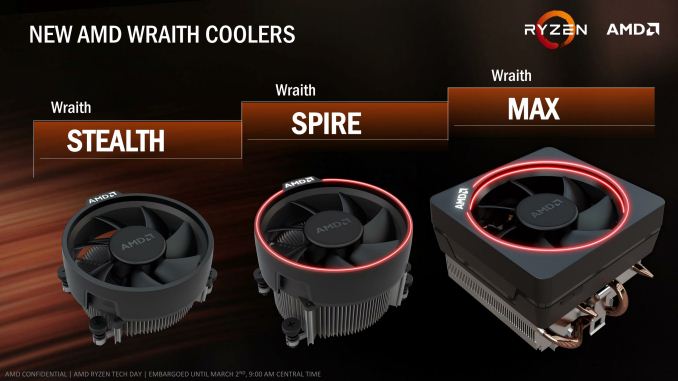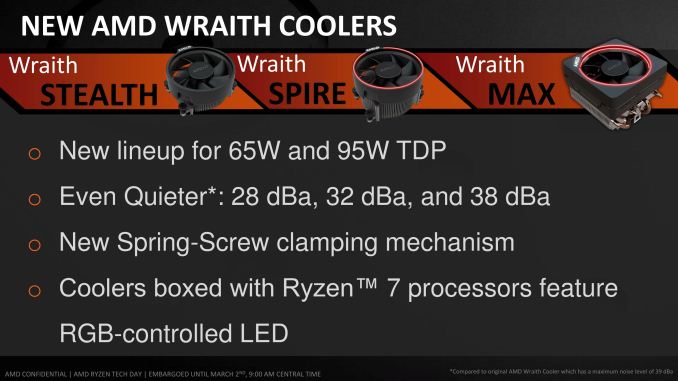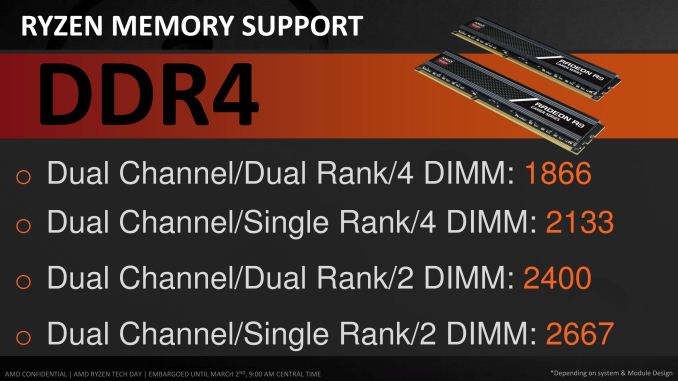The AMD Zen and Ryzen 7 Review: A Deep Dive on 1800X, 1700X and 1700
by Ian Cutress on March 2, 2017 9:00 AM ESTAMD Stock Coolers: Wraith v2
When AMD launched the Wraith cooler last year, bundled with the premium FX CPUs and highest performing APUs, it was a refreshing take on the eternal concept that the stock cooler isn’t worth the effort of using if you want any sustained performance. The Wraith, and the 125W/95W silent versions of the Wraith, were built like third party coolers, with a copper base/core, heatpipes, and a good fan. In our roundup of stock coolers, it was clear the Wraith held the top spot, easily matching $30 coolers in the market, except now it was being given away with the CPUs/APUs that needed that amount of cooling.
That was essentially a trial run for the Ryzen set of Wraith coolers. For the Ryzen 7 launch, AMD will have three models in play.
These are iterative designs on the original, with minor tweaks and aesthetic changes, but the concept is still the same – a 65W near silent design (Stealth), a 95W near silent design (Spire), and a 95W/125W premium model (Max). The 125W models come with an RGB light (which can be disabled), however AMD has stated that the premium model is currently destined for OEM and SI designs only. The other two will be bundled with the CPUs or potentially be available at retail. We have asked that we get the set in for review, to add to our Wraith numbers.
Memory Support
With every generation of CPUs, each one comes with a ‘maximum supported memory frequency’. This is typically given as a number, with the number aligning with the industry standard JEDEC sub-timings. Technically most processors will go above and beyond the memory frequency as the integrated memory controller supports a lot more; but the manufacturer only officially guarantees up to the maximum supported frequency on qualified memory kits.
The frequency, for consumer chips, is usually given as a single number no matter how many memory slots are populated. In reality when more memory modules are in play, it puts more strain on the memory controller so there is a higher potential for errors. This is why qualification is important – if the vendor has a guaranteed speed, any configuration for a qualified kit should work at that speed.
In the server market, a CPU manufacturer might list support a little differently – a supported frequency depending on how many memory modules are in play, and what type of modules. This arguably makes it very confusing when applied at a consumer level, but on a server level it is expected that OEMs can handle the varying degree of support.
For Ryzen, AMD is taking the latter approach. What we have is DDR4-2666 for the simplest configuration – one module per channel of single rank UDIMMs. This moves through to DDR4-1866 for the most strenuous configuration at two modules per channel with dual-rank UDIMMs. For our testing, we were running the memory at DDR4-2400, for lack of a fixed option, however we will have memory scaling numbers in due course. At present, ECC is not supported ECC is supported.













574 Comments
View All Comments
Crono - Thursday, March 2, 2017 - link
A Hero Has RyzenSweeprshill - Thursday, March 2, 2017 - link
Lived up to the hype. Ryzen is a beast. Intel needs massive price cuts on their 2011-v3 chips. Well done AMD, best price/performance CPUs on the market and as fast or faster than Intel performance.sans - Thursday, March 2, 2017 - link
Hey, what you have found which features improving on AMD's crap has been found in Intel's products for years.Nem35 - Thursday, March 2, 2017 - link
Yeah, and it's beating the Intel. Funny, right?Sweeprshill - Thursday, March 2, 2017 - link
Yeah these new AMD chips are monsters. Wondering how large the price cuts are that Intel will bring to their 2011-v3 chips to compete.czerro - Friday, March 3, 2017 - link
Intel already slashed prices pretty drastically 4 days ago, to kinda deflate Ryzen's release. Before price cuts, Ryzen had a huge price and performance advantage at all metrics, and Intel would have looked ridiculous.I can't believe people aren't reporting the price-cutting right before Ryzen release more. Intel only did it to save face on graphs and confuse people. Ryzen definitely had Intel by the balls a week ago before the price cuts.
It's great that we all have options now, but this really smeared Ryzen's release in a cheap way that anybody can point out all those Intel chips were 100-200 dollars more expensive less than a WEEK ago.
SodaAnt - Saturday, March 4, 2017 - link
No, Intel hasn't slashed prices. There was a sale at microcenter a few days back, but there's no across the board official price cut on Intel chips.Notmyusualid - Monday, March 6, 2017 - link
@ SodaAntAgreed, I see no Intel price drops either.
Notmyusualid - Friday, March 3, 2017 - link
@ Nem35Incomplete review.
After seeing a gaming-focused review, I'd say the AMD procs are just OK. I welcome AMD is back with a fighting chance, but about half my purchase choice will be game-inspired.
Quote:
"For gaming, it’s a hard pass. We absolutely do not recommend the 1800X for gaming-focused users or builds, given i5-level performance at two times the price."
I'm not a 'fanboi', as I'd have no trouble fitting a 1700X in a build I wouldn't game in. But otherwise, like another reviewer said, its a hard pass.
Alexvrb - Saturday, March 4, 2017 - link
For gaming builds the upcoming Ryzen 5 and 3 series will offer a lot more bang for your buck and will compete much more aggressively. However, the Ryzen 7 still offers decent gaming performance and excellent performance everywhere else. The gobs of cores may come in handy in the future too, even in games - as more threads will be available on more rigs, devs will take notice. This year AMD is definitely lowering the pricing for 8-16 thread processors, clearing a path for the future of gaming.With that being said I still think that when strictly considering gaming, their Ryzen 3/5 quadcore models will be a far better value, especially as current-gen games aren't often built in such a way that they can take advantage of the Ryzen 7.